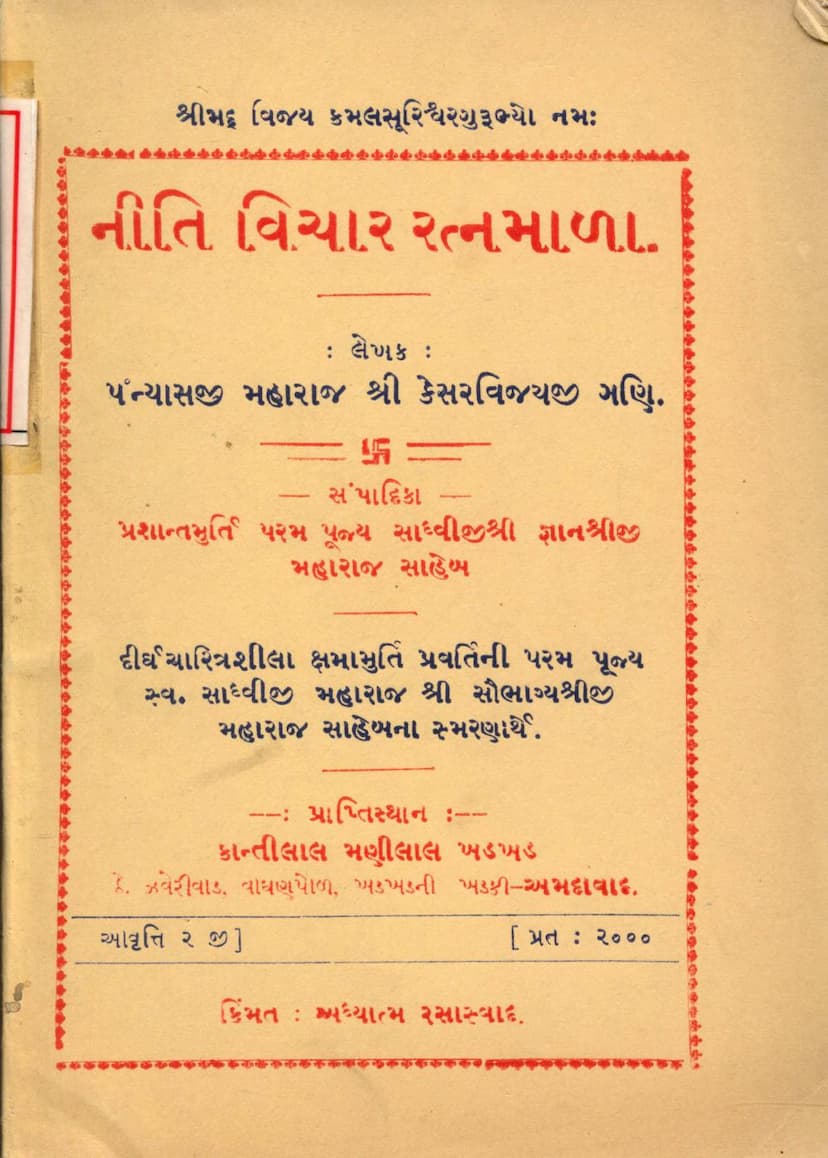Niti Vichar Ratnamala
Added to library: September 2, 2025

Summary
Here's a comprehensive summary of the Jain text "Niti Vichar Ratnamala" by Kesarvijay Gani and Gyanshreeji, based on the provided text:
Book Title: Niti Vichar Ratnamala (Garland of Jewels of Ethical Thought)
Author(s): Kesarvijay Gani (compiler/writer), Gyanshreeji (editor)
Publisher: Kantilal Manilal Khadkhad
Overall Theme: "Niti Vichar Ratnamala" is a collection of ethical sayings, principles, and thoughts aimed at guiding individuals towards a virtuous, peaceful, and meaningful life. It draws from Jain philosophy and emphasizes the importance of inner development, righteous conduct, and mindful living. The book serves as a source of wisdom for navigating life's challenges and cultivating a positive mindset.
Key Concepts and Themes:
-
The Power of Thought and Mind:
- The book repeatedly highlights that happiness and sorrow are primarily determined by one's mental state, not external circumstances.
- Cultivating positive thoughts, controlling desires, and practicing mental discipline are crucial for well-being.
- Overcoming negative thoughts, laziness, and mental weakness is essential for progress.
-
Ethical Conduct and Virtue:
- Emphasis is placed on virtues like truthfulness, non-violence (Ahimsa), self-control (Sanyam), contentment, forbearance (Kshama), charity (Daan), and ethical behavior.
- The text stresses the importance of righteous actions and their consequences. Living a virtuous life leads to happiness, while misconduct results in suffering.
- Specific virtues like humility, honesty, gratitude, and compassion are encouraged.
-
Self-Discipline and Control:
- Controlling one's senses, speech, mind, and body is paramount. The text compares the mind to an untamed horse that needs to be disciplined.
- Practicing self-restraint in eating, speaking, and desires is repeatedly advised.
- The importance of a disciplined routine and consistent effort is highlighted.
-
Dealing with Adversity and Challenges:
- The book offers guidance on facing difficulties with courage, perseverance, and a positive outlook.
- It encourages learning from mistakes, not succumbing to despair, and maintaining equanimity during tough times.
- Adversity is seen as a testing ground for character and a catalyst for growth.
-
The Nature of Happiness and Suffering:
- True happiness is an internal state, not dependent on external possessions or worldly pleasures, which are temporary.
- Attachment and desire are identified as the root causes of suffering.
- Contentment and detachment are presented as paths to lasting peace.
-
Knowledge and Wisdom:
- The pursuit of true knowledge, especially self-knowledge and knowledge of the soul, is encouraged.
- Wisdom is gained through experience, reflection, and learning from others.
- The text distinguishes between superficial knowledge and profound spiritual understanding.
-
Social Harmony and Relationships:
- The importance of maintaining good relationships, practicing forgiveness, and avoiding conflicts is emphasized.
- Speaking kindly, listening patiently, and being considerate of others are crucial for social harmony.
- The text advises against gossip, slander, and unnecessary criticism.
-
Spiritual Progress and Liberation:
- The ultimate goal is presented as spiritual liberation (Moksha) through self-realization and detachment from worldly attachments.
- Practices like meditation, contemplation, and virtuous living are seen as means to achieve this goal.
- The concept of karma and its impact on one's spiritual journey is central.
Structure and Style: The book is a compilation of numerous short, aphoristic verses and thoughts, covering a wide range of ethical and spiritual topics. The language is generally accessible, though it reflects a traditional Jain discourse. The sheer volume of these "jewels of thought" provides a comprehensive guide to ethical living from various perspectives.
Key Takeaways for the Reader:
- Internal Focus: The primary emphasis is on transforming oneself from within rather than seeking change in the external world.
- Action and Practice: Mere knowledge is insufficient; putting these ethical principles into practice is crucial.
- Perseverance: Progress on the spiritual and ethical path requires continuous effort and resilience in the face of setbacks.
- Balance: The text advocates for a balanced approach to life, integrating spiritual understanding with practical conduct.
In essence, "Niti Vichar Ratnamala" serves as a practical manual for a life well-lived, grounded in ethical principles and spiritual wisdom, offering guidance for personal growth, societal well-being, and ultimate liberation.